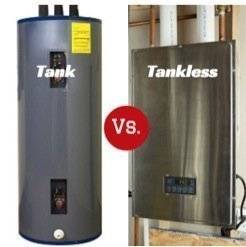You’re probably used to a storage tank water heater, but you’ve heard good things about tankless water heaters.
Things like, they give continuous hot water and are more energy efficient than tank water heaters.
But are tankless water heaters worth the investment? That’s the question we’ll answer in this article.
We’ll look at these 5 important factors to help you make your decision:
- Water heating ability
- Energy efficiency
- Total cost
- Lifespan
- Safety issues
Water heating ability
Tank water heaters
You’re already familiar with how these work. They heat the water in a tank and once the hot water is gone, you’ll have to wait until it heats more water.
The amount of hot water it can provide at once is determined by the tank size (measured in gallons).
Tankless water heaters
The biggest selling point of tankless water heaters is that they provide hot water on demand.
But let’s clear up a few things about how tankless water heaters work.
They don’t provide “instantaneous” hot water (you’ll always have that cold water sandwich in the morning). However, they can provide continuous hot water. But there are limits to how much it can provide at one time.
Tankless water heaters are limited by gallons provided per minute (gpm). And gpm decreases the colder it gets outside (because it needs more time to heat the water).
Thankfully, a tankless water heater’s gpm does not decrease much in Arizona because it does not get very cold here.
Make sure you have a plumber figure out the tankless water heater size your family needs.
Energy efficiency
Tank water heaters
The problem with tank water heaters is that they’re heating a large reservoir of 140 degree water 24/7, which is a waste because you don’t need hot water 24/7.
Tankless water heaters
Here’s another area where the tankless water heater shines-it only heats water when you need it, saving you money.
According to ENERGY STAR:
By heating water only when you need it, ENERGY STAR certified tankless water heaters save the typical family more than $80 per year, or $1,700 over the lifetime of the water heater, on gas bills compared to a standard storage model. Larger families can save even more!
Total cost
Note: Total cost of both tank and tankless depends on many factors, like size, brand, and installation requirements. So we’re only presenting estimates.
Tank water heaters
The biggest pro of a tank water heater is the low cost.
Tankless water heaters
Here’s the biggest knock against the tankless water heater: upfront cost. In general, a tankless water heater will cost about 2-3 times more than a tank water heater of similar quality.
Lifespan
Tank water heaters
These live an average of 10-15 years.
Tankless water heaters
These live an average of 20+ years.
Safety issues
Tank water heaters
Because of hard water and sediment, tank water heaters can rust and spring a leak over time (see the importance of an annual water heater flush.)
Worst case scenario: the water heater can flood your home. According to disastersafety.org, “Water heater failures cost an average of $4,444 per incident after the deductible was paid.”
Tankless water heaters
These don’t hold large volumes of water, so you don’t have to worry as much about leaks or flooding.
The final word
So, is a tankless water heater worth the investment? Well, if you’re looking from a monetary standpoint, it may not be. The upfront cost is so high, and paying it back may or may not happen depending on several factors.
But if you’re looking at it from a comfort standpoint, tankless water heaters may be worth it in Arizona to get continuous hot water. You just need to make sure the tankless water heater is sized right for your home.
The question you need to answer is this: Do you want to pay the higher upfront cost to gain long-term comfort?
If you really want that continuous hot water comfort but need financial help, George Brazil can provide financing to help you out.
Got questions? Ask our expert for help.

